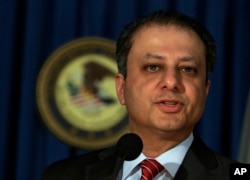A huge Paris-based bank, BNP Paribas, has forfeited some $8.8 billion to the U.S. Department of Justice after it was convicted of handling funds in violation of U.S. sanctions against Iran, Cuba and Sudan.
Now U.S. justice officials are considering whether to use part of that forfeiture to compensate people harmed by the three governments.
New York State banking regulators, who worked alongside federal authorities on the BNP case, say BNP cleared more than $190 billion involving Iran, Cuba and Sudan from 2002 through 2012. State regulators also say the bank intentionally hid information from those transactions that would identify their source.
U.S. Attorney Preet Bharara said BNP Paribas engaged in “the hat trick of sanctions violations.” The prosecutor said the bank engaged in what he called “a tour de fraud.”
The forfeiture by BNP, fourth-largest bank in the world, became official on May 1 when the financial house was sentenced in federal court. It agreed on June 30, 2014 that it would give up the cash when it admitted guilt in the sanctions violations.
Then-U.S. Attorney General Eric Holder underscored the seriousness of the bank’s criminal activity.
“BNP Paribas went to really elaborate lengths to conceal prohibited transactions, cover its tracks, and deceive U.S. authorities,” Holder said, adding “These actions represent a serious breach of U.S. law.”
'Satellite banks'
The U.S. criminal complaint against BNP says it set up a network of so-called “satellite banks” to try to disguise both the origins and destinations of financial transactions.
BNP CEO Jean-Laurent Bonnafé admitted its role in a 2014 statement.
“We deeply regret that past misconduct that led to this settlement," he said
The Justice Department said earlier this month that it will be using the funds to compensate "persons and entities" harmed by the Cuban, Iranian, and Sudanese regimes.
"In an effort to better understand who may have been harmed by these regimes, the Justice Department is inviting individuals or their representatives to provide information describing the nature and value of the harm they suffered,” the department said in a statement.
Washington-based international attorney Steven Schneebaum said the settlement route could be complex.
“In the case of financial claims — expropriations, breached contracts, that sort of thing — the process would not be all that complicated,” he told VOA via e-mail.
“In the case of claimed deaths or unjust imprisonment, I imagine that the Department would apply lost earnings and pain-and-suffering guidelines that already exist [insurance companies use them routinely, and so do domestic courts in personal injury cases],” he wrote.
Attorney Heather Lowe with the better-governance and transparency group Global Financial Integrity, says that at least in the case of Sudan, group reparations are the best course of action.
“I'm not sure that individual claims is the right way to go about this,” Lowe told VOA via e-mail, “because you are talking about harms that were inflicted on an entire society; because the bank contributed to ensuring that a brutal regime continued to have access to funds to keep its soldiers paid, weapons supplied, etc.”
As for claims against the Cuban government, Schneebaum says that “is likely to be very contentious.
"Many Americans have already had their Cuban claims vetted by the FCSC [the Justice Department’s Foreign Claims Settlement Commission], and they have been waiting for a long time to receive anything," she said. "They will scream loudly if newcomers are allowed to jump the BNP ‘queue."
Claims involving Iran may face the same scrutiny, experts say
“An Iranian national whose company was nationalized by the ayatollahs in 1980 would have no justifiable claim in the U.S.: under U.S. law, s/he was not the victim of an illegal act. It is hard to see why such a person, who would not be allowed to file a lawsuit to vindicate his claim, should be rewarded in the United States,” attorney Schneebaum said.






